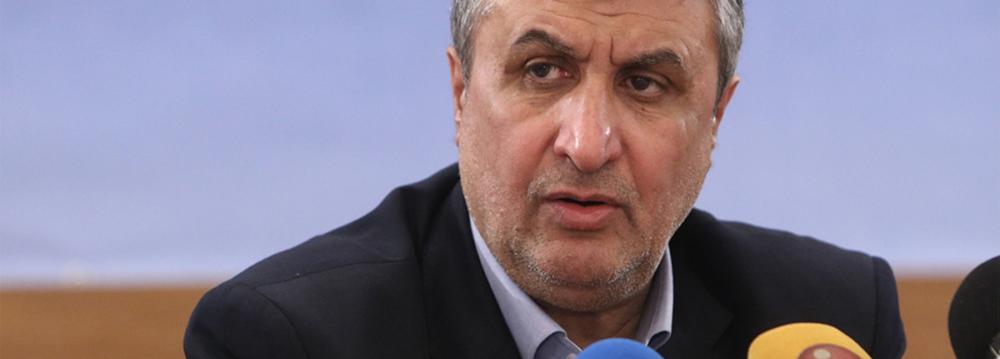Iran’s nuclear chief said Tehran will not be affected by Israeli propaganda campaigns aimed at impeding the country’s progress.
Talking to reporters on Tuesday, Mohammad Eslami, head of the Atomic Energy Organization of Iran, said cooperation between Iran and the International Atomic Energy Agency will only by limited to the IAEA safeguards and the nuclear Non-Proliferation Treaty.
“Relations between Iran and the agency must be based on the regulations within the framework of the IAEA safeguards and the NPT,” the official said, IRNA reported.
“Our ties with the agency are in line with these laws … and the agency monitors Iran’s nuclear activities in accordance with these laws and regulations.”
Eslami described media reports against Tehran’s nuclear program as a “psychological operation”, noting that the allegations aim to portray Tehran as a country not committed to non-proliferation and hinder Iran’s scientific and technological progress.
The AEOI chief stressed that such psychological warfare will not disturb Iran’s plans. “We will move forward on our path.”
Eslami also said the IAEA’s request to access the TESA Karaj Complex, a centrifuge component manufacturing workshop in northcentral Iran, is beyond the safeguards agreement and therefore “unacceptable”.
Iran’s nuclear chief says if the IAEA seeks access to the Karaj nuclear site under the JCPOA, other parties must take action and fulfill their obligations
He said if the UN nuclear agency seeks access to the nuclear site under the 2015 nuclear agreement, known as the Joint Comprehensive Plan of Action, other parties must take action and fulfill their obligations.
“If the JCPOA is supposed to be operational, all [parties] must fulfill their obligations and it will not be the case that Iran fully complies with its obligations and the other parties do not fulfill their obligations.”
“When they do not fulfill their commitments and impose harsh, illegal and unjust sanctions on Iran and expand them every day, there is no reason to force us to comply with them [Iran’s commitments under the JCPOA]. We act within the framework of IAEA safeguards and NPT and do not accept anything other than that,” Eslami noted.
The JCPOA was signed by Iran and six world powers in 2015. Under the deal, Tehran agreed to put limits on some aspects of its nuclear activities in exchange for the removal of draconian international sanctions.
In 2018, however, the US pulled out of the pact and reinstated sanctions under the “maximum pressure campaign” against the Islamic Republic, effectively depriving Iran of the deal’s benefits by forcing third parties to stop doing business with Iran.
Iran remained patient for an entire year, after which it began to take incremental steps away from its nuclear obligations, especially after Europeans failed to salvage the deal under the US pressure.
Tehran’s decision to ramp up its nuclear activities prompted other parties to revive talks earlier this year.
Iran has made it clear that it seeks the removal of all sanctions in a verifiable manner and guarantees from Washington that it will not abandon the deal and violate its commitments again.


